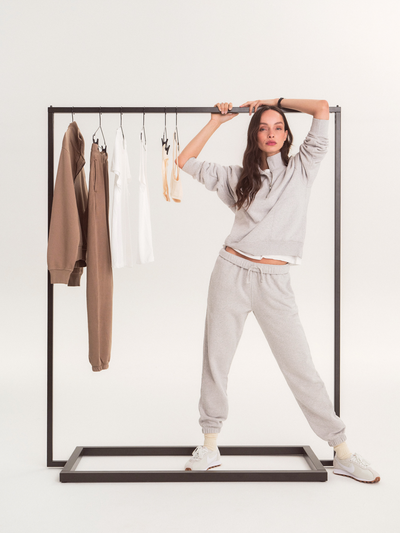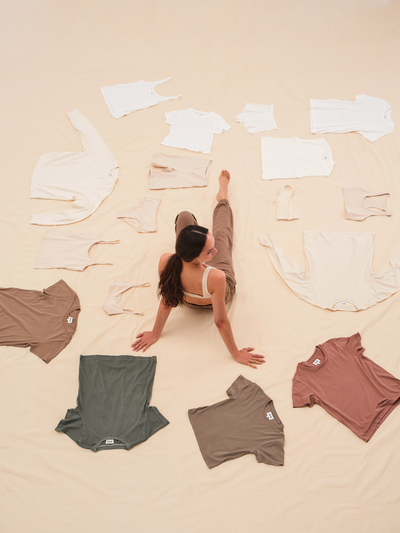Tell us a little bit about your background—where are you from and what did you do before creating your brand?
I’m originally from Orange County, and graduated from Loyola Marymount University with a degree in sociology. When I graduated college, I didn’t know what I wanted to pursue and ended up taking an administrative position at a private equity firm to pay the bills. I always thought I’d try to start something of my own but didn’t know what that would look like. At this time, I was also really into vintage and started collecting vintage t-shirts, which then parlayed into starting MATE Vintage.
Can you share some of the story behind how you launched MATE the label?
Building MATE has been an ever-evolving journey, and the brand looks completely different today than when it first began. As mentioned, I originally launched MATE as a vintage t-shirt company, but over time, I learned so much about the fashion industry’s impact on both human health and the environment. The shift toward becoming a clean, non-toxic brand was deeply personal and it grew out of my own commitment to living a healthier, more conscious lifestyle.
I became increasingly aware that most conventional clothing is made from synthetics like polyester, nylon, and spandex, which are materials derived from fossil fuels that shed microplastics. Even cotton, if not grown organically, is often treated with harmful pesticides and chemicals that harm our ecosystems. Many fabrics are also finished with toxic dyes and treatments that can affect our skin and overall well-being.

How did you educate yourself on the dangers of toxins in clothing? Are there any go-to resources you’d like to share?
The a-ha moment for me was listening to a cotton farmer’s story via the Conscious Chatter podcast where she spoke about how her husband was recently diagnosed with brain cancer and that farmers have a significantly higher rate of cancer with being exposed to pesticides. From there I watched documentaries such as River Blue and The True Cost. I also witnessed first hand what goes into apparel manufacturing as we produced 100% of our line in Los Angeles. I would highly recommend Alden Wicker’s book, “To Dye For” as she deep dives into real life examples of the impact of toxic clothing.
What sparked your interest in organic activewear? Why do you believe people need to switch to 100% organic?
My interest in organic activewear really grew out of my deeper understanding of how conventional clothing affects both human health and the planet. Once I realized that synthetic fabrics like polyester and nylon are derived from fossil fuels and shed microplastics, it was impossible to ignore. Even conventionally grown cotton can be incredibly toxic. I believe switching to 100% organic isn’t just a lifestyle choice; it’s a necessity if we want to protect our bodies and reduce harm to the environment. Our skin is our largest organ, and what we wear every day matters.
What makes this approach to fashion personal to you? Why are you passionate about it?
This journey is deeply personal for me, especially as a mom to two young kids. As I became more conscious of what I was putting in and on my body, I started questioning the materials in my clothing as well. That curiosity turned into concern when I learned how damaging conventional manufacturing is to people involved in every step of the supply chain. I want to live a life that’s aligned with my values, and creating clean, non-toxic clothing is one way I can contribute to a healthier world for my kids.

What are your absolute priorities when it comes to your activewear and other areas of your lifestyle? What are some things you do to keep your life and home clean, sustainable and nontoxic?
When it comes to activewear, my top priorities are clean, certified organic materials and responsible manufacturing. I also value supply chain transparency; knowing where and how something is made. Beyond clothing, I try to apply the same philosophy to my home and daily habits. I avoid fragrances and harsh chemicals, choose eco-friendly cleaning products, and try to reduce plastic exposure wherever I can.
How did you discover Dirty Labs? What do you love about the brand and product / why would you recommend it to your friends and family?
I discovered the brand years ago through a friend of mine who connected me with the founders directly as we have similar business values and an aligned mission. I have been using the product ever since! So glad that we are partnering together.










